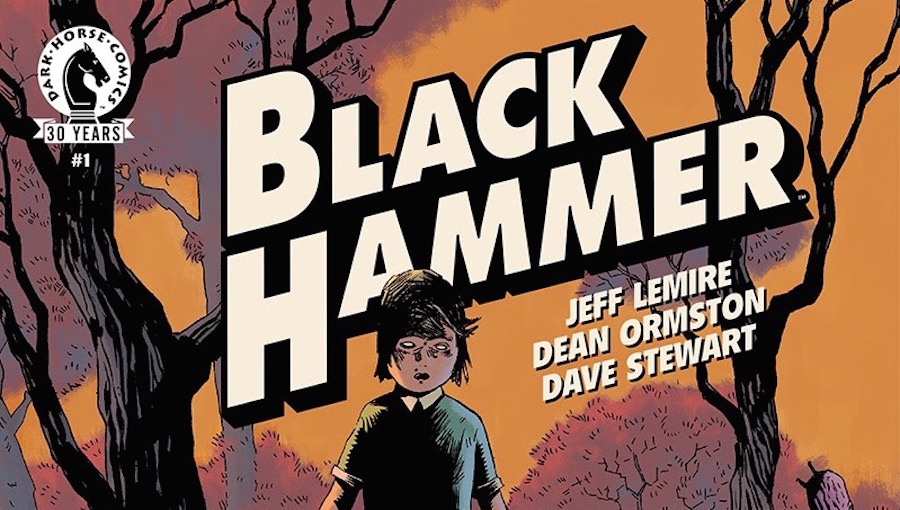The ideas behind Jeff Lemire’s (All New Hawkeye, Descender, Old Man Logan) much anticipated new title, Black Hammer, are intriguing, but Issue #1 has yet to show the potential for how compelling the premise can be. That isn’t necessarily a problem. A lot of this is simply due to the fact that the story hasn’t really started. This is mostly exposition – Issue #0 kind of stuff. This is your pilot episode.
It’s been ten years since a group of former superheroes gave up their hero lives and were sent to live on a farm somewhere outside of the city. The details as to why they chose this aren’t known yet. The first several pages are filled with Abraham, the sort of father figure to the group, narrating to himself or to us about how much he fell in love with the farm. It’s a perfect fit for him; however, that’s not the case for everyone else – especially Gail who sounds like she’s a woman trapped in a child’s body. She smokes cigarettes, curses, is especially petulant, and can fly. The others seem to have grown fairly impartial to their predicament, trying their best to be normal. The first few pages feel like an oddball superhero sitcom. What if superheroes were sent to Green Acres? The situational elements might play funnier if I had a better idea of who these characters were previously. (Reading through it a second time even already begins to elevate the underlying comedy). Regardless, everyone seems tired of the status quo. Abraham thinks everyone whines too much, Barbalien misses his freedom, Colonel Weird has lost his mind, Talky Walky has become a sort of house wife… They are all preparing for a ten-year anniversary gathering, so things that have been bubblibg to the surface a little.
In a way, it plays like satire but doesn’t fully embrace that angle, as it doesn’t elevate the stakes of their current situation with who they used to be. Their current situation is playing house wife, petulant child, farm hand – all the things you’d see on a farm, but with superhero-sized reactions which are, at the moment, amiss here. Maybe the fact that they’ve been on the farm for ten years has made them all a little too ho-hum about it all. They’ve gotten used to not being and acting like superheroes. They have flashes of these moments, vague recollections. The one thing their predicament has done is that it’s certainly made Abraham incredibly sensitive to everything. He’s meant to sound like the voice of reason, but everyone else, in their complaints and desires, sounds far more reasonable than he does. There even seems to be a bit of denial in him. When Gail (the child) is caught stealing cigarettes by the sheriff, the sheriff is made to feel like he’s merely taking out his aggression on the child due to the fact that Abraham is dating his ex-wife. Really, though, the sheriff has every right to be upset about a kid stealing cigarettes. It’s a weird moment that makes Abraham and his love interest, Tammy (a waitress at the local diner), seem like the least reasonable characters in the book. This is the element that intrigues me the most, this very subtle psychological tic that could send these characters reeling in every different direction as we get to know them better. Abraham forces himself to not see the truth about what’s really going on, even in himself. Whether or not Lemire deals with this or just lets moments like these slide remains to be seen. I really hope that as the book continues, he deals with these weird elements head on. Given that I’m loving his work on All New Hawkeye, I can only imagine he will.
Dean Ormston (art) and Dave Stewart’s (colors) work is perfectly eccentric for the book and also incredibly dynamic. They have an eye for creating visceral images with depth and beauty even when there is no real action, fleshing out the space these characters inhabit without breaking a sweat.
This is all set up, and it flows and runs smoothly with some light touches of satire and interesting story elements to be built upon. The payoff is slight at the end of the first issue, as they religiously gather around a black hammer left to lie by itself untouched, but you feel that Lemire is letting character subtlety guide us into the world as opposed to cheap tricks. I’m all for that if it pays off in the long run. I look forward to coming back to this first issue six months from now to see how it plays once we get to know the characters a little better. With the basic elements in place, I await Issue #2 to see how Lemire starts ruffling feathers. (That’s the best farm analogy I could pull out of my hat right now.)

